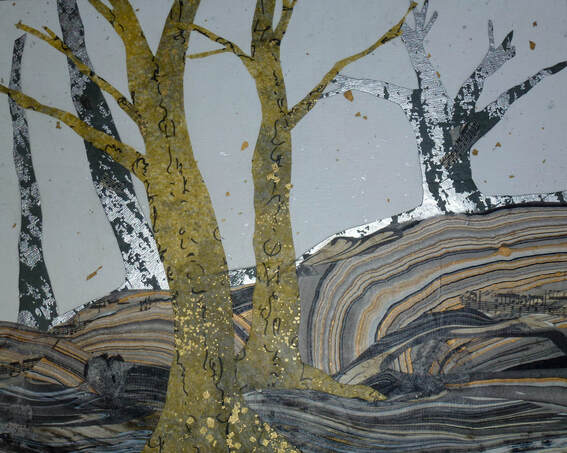Static Metamorphosis
By Norie Suzuki
January 15, 2023
January 15, 2023
You know you’re not Charlie. “C” as in conundrum, accompanied by an ever-silent “H.” An “R” sound doesn’t even exist in Japanese.
So who are you? One fact is clear. You, probably at around three, are plucked from a dusty roadside like goose grass and transplanted to a hut overcrowded with war orphans. You are in a documentary film of 1945, surrounded by a few American soldiers. It is a silent film. A campaign film, featuring how the Americans helped rebuild Okinawa. In the subtitle, it says you’re named Charlie.
By the time you start school, you are herded to play in the fenced yard on Sundays. Outside the enclosure, to-be parents appraise you, some desperately looking for the likeness of their lost child, others pricing your body parts and horsepower. When you are in the fifth grade, you fall into the hands of the latter, who claim you’re their Shiro, their grandson. Instead of books and pencils in your new home, you are given a sickle and a pair of battered gloves too big for you. Out in a sugar cane field, you strip off the leaves from stalks taller than you, bundle the canes heavier than you, and respond to the call of Shiro, way into adulthood until a stranger who catches you in the documentary film knocks on your shabby apartment door and hugs you tightly, chanting Yasushi, Yasushi.
You are told that you’re not Shiro, that Shiro was the name of a dog once owned by the childless, old couple, long gone by then. The man who claims to be your uncle takes you to your ancestral home, where your aunts and cousins swarm around you, their eyes poking at your face, trying to map your nose, cheekbone, eyebrows, and mouth to one of theirs. “Look,” the uncle says and hands you a red pine mortuary tablet the size of your palm. He points at the name, Yasushi, engraved on the back, and explains that everyone thought you were dead with your parents. You trace your name on the mortuary tablet as if you were rubbing a magic lamp to bring yourself back to life.
You petition to correct your record, but how can you without any proof? Your oldest trackable name is Charlie, then Shiro—your life as a dog. No matter how many times you visit the municipal office, you cannot resurrect Yasushi without papers. You merely wear out everyone, alienating your kin who want no trouble, who just went along with the uncle to play his game, temporarily. Nobody knows who you are. Nobody cares but you.
Alone, in your apartment, you breed Okinawan Atlas moths in different stages: a Tupperware filled with brownish eggs; a larger container with bluish-green larvae that keep crunching bishop tree leaves nonstop; a wired cage where caterpillars molt before spinning cocoons. You imagine the pain of pupae going through histolysis. When an Atlas moth finally emerges, you open the lid of the cage to let it fly out of your apartment. But it never does. It cannot carry its weight and remains affixed on the wall, with its cobra-head wingtips pointing at you.
So who are you? One fact is clear. You, probably at around three, are plucked from a dusty roadside like goose grass and transplanted to a hut overcrowded with war orphans. You are in a documentary film of 1945, surrounded by a few American soldiers. It is a silent film. A campaign film, featuring how the Americans helped rebuild Okinawa. In the subtitle, it says you’re named Charlie.
By the time you start school, you are herded to play in the fenced yard on Sundays. Outside the enclosure, to-be parents appraise you, some desperately looking for the likeness of their lost child, others pricing your body parts and horsepower. When you are in the fifth grade, you fall into the hands of the latter, who claim you’re their Shiro, their grandson. Instead of books and pencils in your new home, you are given a sickle and a pair of battered gloves too big for you. Out in a sugar cane field, you strip off the leaves from stalks taller than you, bundle the canes heavier than you, and respond to the call of Shiro, way into adulthood until a stranger who catches you in the documentary film knocks on your shabby apartment door and hugs you tightly, chanting Yasushi, Yasushi.
You are told that you’re not Shiro, that Shiro was the name of a dog once owned by the childless, old couple, long gone by then. The man who claims to be your uncle takes you to your ancestral home, where your aunts and cousins swarm around you, their eyes poking at your face, trying to map your nose, cheekbone, eyebrows, and mouth to one of theirs. “Look,” the uncle says and hands you a red pine mortuary tablet the size of your palm. He points at the name, Yasushi, engraved on the back, and explains that everyone thought you were dead with your parents. You trace your name on the mortuary tablet as if you were rubbing a magic lamp to bring yourself back to life.
You petition to correct your record, but how can you without any proof? Your oldest trackable name is Charlie, then Shiro—your life as a dog. No matter how many times you visit the municipal office, you cannot resurrect Yasushi without papers. You merely wear out everyone, alienating your kin who want no trouble, who just went along with the uncle to play his game, temporarily. Nobody knows who you are. Nobody cares but you.
Alone, in your apartment, you breed Okinawan Atlas moths in different stages: a Tupperware filled with brownish eggs; a larger container with bluish-green larvae that keep crunching bishop tree leaves nonstop; a wired cage where caterpillars molt before spinning cocoons. You imagine the pain of pupae going through histolysis. When an Atlas moth finally emerges, you open the lid of the cage to let it fly out of your apartment. But it never does. It cannot carry its weight and remains affixed on the wall, with its cobra-head wingtips pointing at you.
Norie Suzuki (she/her) was born and educated bi-lingually in Tokyo, Japan, where she currently writes, resides, and works as a simultaneous interpreter. She received an MFA in creative writing from Sarah Lawrence College in New York. Her work has appeared or is forthcoming in Extra Teeth and SUSPECT.

